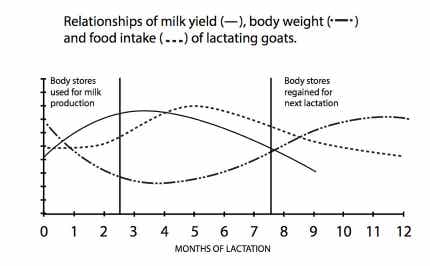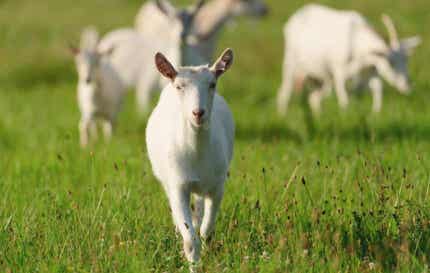ORGANIC ALFALFA PELLETS AND THE LACTATING DAIRY GOAT
Dr. Stephen Duren, Performance Horse Nutrition and Standlee Premium Products Nutritional Consultant
Goat milk is gaining popularity as low lactose milk for lactose intolerant people and as a premium ingredient in artisan cheeses and natural yogurts. With the soaring interest in goat’s milk as a healthy, natural alternative to cow milk, it is important to ensure dairy goats are fed properly to enhance milk production and produce a high quality product.
Feeding the Milking Doe
The lactation cycle of a doe consists of the dry period, early lactation, mid-lactation and late lactation. The dry period coincides with late pregnancy when the doe is directing dietary nutrients to proper development and growth of the fetus. Nutrition during the dry period is certainly critical to ensure the goat kids are born healthy, but also to the success of the overall lactation cycle. During the dry period, a doe will gain body condition thereby storing energy that can be metabolized to support the high calorie demands of early lactation. A doe will also begin to fill the udder and increase mineral, particularly calcium, and protein uptake from the digestive system. Alfalfa is a key high calorie, high mineral, high protein forage ingredient that can be successfully utilized to prepare the doe for parturition and early lactation.

Early lactation is considered the time from parturition to approximately 90 days of lactation. During early lactation, the nutrient demands of milk production will exceed the ability of the doe to consume enough feed to satisfy these nutrient demands. Milk production typically peaks between 45 and 60 days of lactation; however, feed intake typically does not peak until 85 – 100 days of lactation. During early lactation, a milking doe will utilize body reserves to sustain milk production. This will result in weight loss and a general loss in body condition. To minimize loss of body condition, lactating goats are fed high quality forage and high energy grain. Feeding high quality forage, such as alfalfa, will provide a fiber source with the most concentrated sources of calories, protein and minerals to aid the doe in off-setting the extreme nutrient demands of early lactation. Feeding lower quality forage will put additional pressure on the doe to eat more grain to satisfy nutrient requirements and likely result in loss of more body condition.

Mid lactation is considered the time from 91 to 220 days of lactation. During this phase of lactation, the amount of milk produced will decline while the intake capacity of the doe will increase. Normally, a lactating doe is capable of maintaining her weight and body condition during this phase of lactation. Toward the end of mid lactation, a doe is also preparing to be rebred. It is critical the doe be maintaining or gaining body condition at this time to enhance conception. High quality alfalfa is still provided on a free-choice basis, while the amount of grain is limit fed to match the milk output of the doe.
The final phase of lactation is late lactation, which is considered the time from 221–305 days of lactation. During this time, the milking doe will gradually regain body condition lost in early lactation. It is preferable for a doe to gain back lost body condition gradually during late lactation compared to rapid weight gain, and potentially fattening during the dry phase. Most commercial dairy goats will be fed only small amounts of grain in late lactation and have the bulk of the energy, protein and minerals provided by high quality alfalfa.
Advantages of SPWF Organic Alfalfa Pellets
Alfalfa has long been established as the “go to” forage for dairy goats due to its high calorie content, high protein content and high calcium content. Pellets are easy to feed and easy to measure the correct amount to be fed. Goats are unable to sort out leaves from the stems, resulting in little to no waste. This size of pellet makes it easy for goats of all breeds and ages to masticate the pellets. Standlee Premium Products Organic Alfalfa Pellets are certified organic by the USDA. This product provides an organic feed alternative for animals and any resulting food production for human consumption

